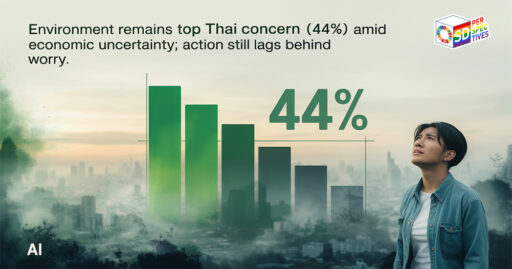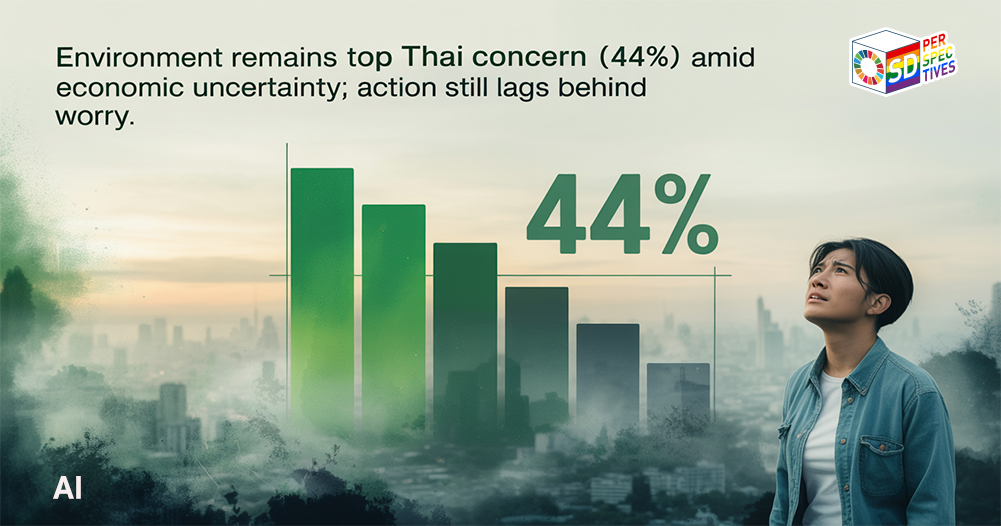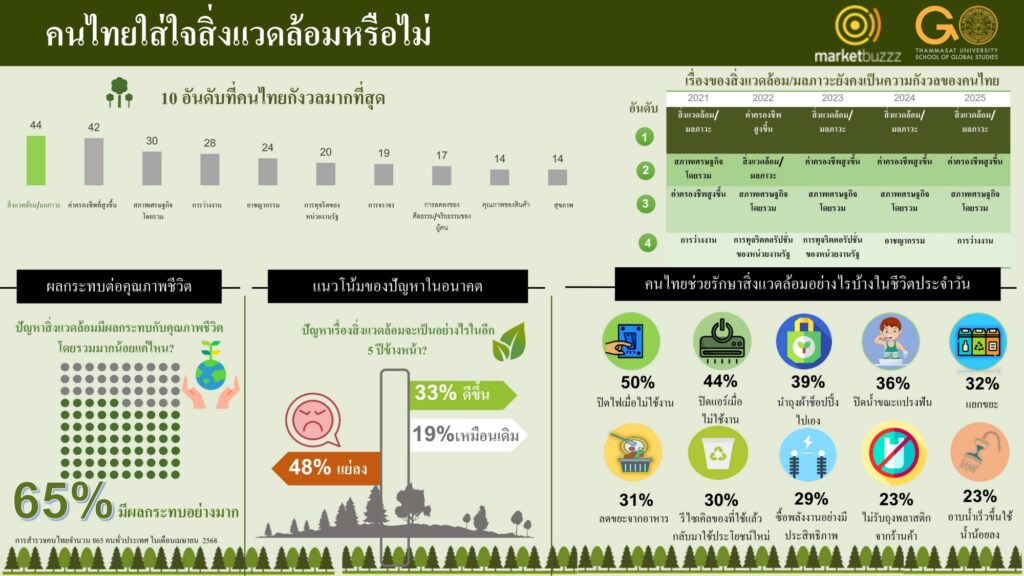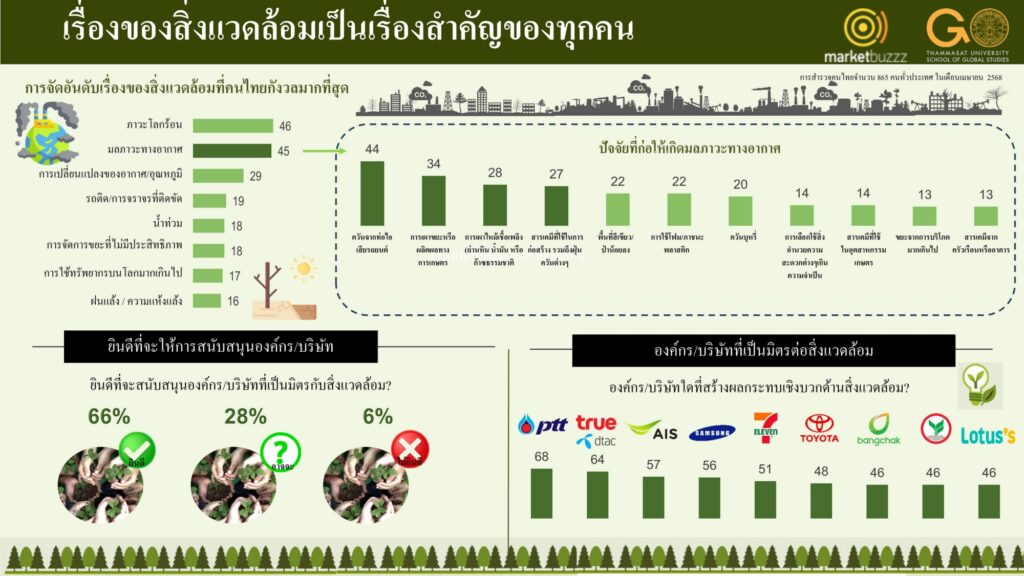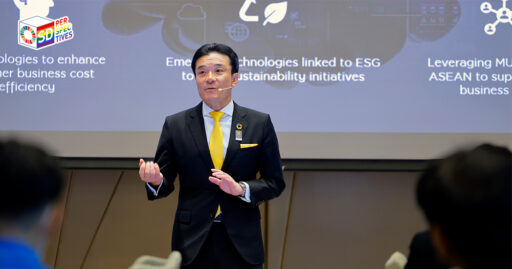June 16,2025…The environment remains Thailand’s number one public concern in 2025, according to the latest nationwide study by Marketbuzzz in partnership with Thammasat University’s School of Global Studies. This continued prioritisation of the environment occurs despite mounting economic pressure and rising prices, which have also increased in concern this year.
This annual survey, conducted since 2019, once again found that “Environment and Pollution” was ranked as the top concern (44%) by Thais and comes despite heightened economic challenges, with rising prices (42%) and economy in general (30%) also ranking high among the top concerns. This consistent result signals an entrenched public worry, even in the face of escalating financial pressures.
The Concern-to-Action Gap High Awareness, Limited Behavioral Change
Yet, while concern is high, the gap between worry and tangible personal action remains significant. 65% of Thais believe environmental issues are having a very big impact on their quality of life, and nearly half (48%) believe the situation will worsen over the next five years. However, when asked what actions they had taken in the past week, the most common behaviors were turning off lights (50%) and air conditioners (44%) relatively easy and habitual acts that require low effort and high individual control.
In contrast, only 23% reported refusing plastic bags at stores, highlighting a sharp drop-off in more publicly visible or socially influenced behaviors.
It’s generally easier for people to change their environmental behaviors when they feel they can personally make a difference. Simple actions like turning off lights or unplugging appliances are more likely to be done because they’re easy to do and give people a sense of control. This also suggests people are more likely to change behaviors when they feel they have personal control and the ability to make an immediate impact. More complex or system-influenced behaviors such as recycling properly remain limited, showing a clear opportunity for guidance, incentives, and structural change.
“This gap between concern and action is not a failure it’s an invitation,” said Grant Bertoli, CEO of Marketbuzzz. “The challenge now is to move people from passive concern to active participation. And brands can play a huge role in this transformation.”
Major Opportunity for Brand Leadership in Sustainability
The 2025 data reveals that 66% of Thais say they are definitely willing to support environmentally friendly brands or companies. However, this doesn’t always directly translate to a change in purchase behavior unless there is parity in other product attributes, at which point environmental packaging or positioning can tip the balance in favor of the more sustainable brand.
Bertoli explains: “Environmental credentials may not necessarily be the number one reason why people purchase, but when everything else is equal price, quality, performance etc then sustainability can be the deciding factor, one offers environmentally friendly packaging or sustainable attributes and the other doesn’t, that can swing the purchase decision.”

Corporate Sustainability as a Catalyst for Change
This opens the door for brands to lead the change by designing for impact. By integrating sustainability deeper into their value proposition and making it visible, relatable, and easy to act upon, brands can shift concern into action — and earn significant brand equity in the process.
The research also identified the top three environmental concerns among Thais as global warming (46%), air pollution (45%), and climate change (29%) — reinforcing the urgent need for widespread, inclusive action across industries and sectors.
Assistant Professor Dr. Prapaporn Tivayanond Mongkhonvanit, Dean of the School of Global Studies at Thammasat University, added: “We are encouraged to see a continued and growing awareness of environmental threats, particularly at a time when economic challenges persist. This indicates that Thai people increasingly recognise the shared responsibility in addressing environmental issues. It also reinforces the urgent need for collaboration between education, business, and policy sectors to accelerate sustainable progress.”
Expanding on the findings, Dr. Prapaporn noted: “The fact that environmental concerns remain strong among Thais, even during times of economic uncertainty, reflects a deep-rooted understanding of the gravity of these issues. However, the persistent gap between concern and action points to a clear need for systemic support — structures and policies that empower individuals to turn awareness into concrete, sustained behavioral change.”
She further emphasized the critical role of the private sector This is where corporate leadership plays a vital role. Businesses possess the resources, scale, and influence to make sustainable options more accessible, affordable, and convenient. When companies lead with environmental responsibility, they not only help mitigate the crisis directly but also enable their customers to be active participants in the solution.
The survey demonstrates that environmental concern continues to be everyone’s business, requiring collaborative action from individuals, companies, and government to translate widespread awareness into meaningful change.
Brands that do step up to provide sustainable alternatives and make eco-friendly choices easier will not only contribute to environmental solutions but also can leverage it to build positive brand association.

